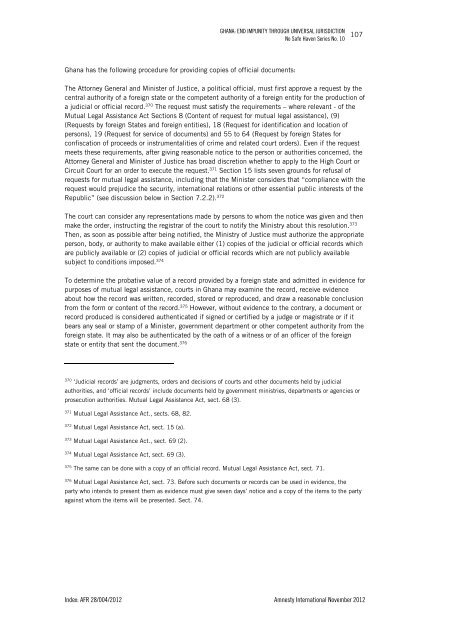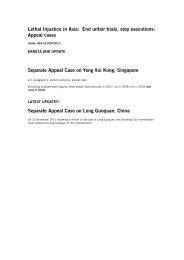Ghana - Amnesty International
Ghana - Amnesty International
Ghana - Amnesty International
Create successful ePaper yourself
Turn your PDF publications into a flip-book with our unique Google optimized e-Paper software.
GHANA: END IMPUNITY THROUGH UNIVERSAL JURISDICTIONNo Safe Haven Series No. 10107<strong>Ghana</strong> has the following procedure for providing copies of official documents:The Attorney General and Minister of Justice, a political official, must first approve a request by thecentral authority of a foreign state or the competent authority of a foreign entity for the production ofa judicial or official record. 370 The request must satisfy the requirements – where relevant - of theMutual Legal Assistance Act Sections 8 (Content of request for mutual legal assistance), (9)(Requests by foreign States and foreign entities), 18 (Request for identification and location ofpersons), 19 (Request for service of documents) and 55 to 64 (Request by foreign States forconfiscation of proceeds or instrumentalities of crime and related court orders). Even if the requestmeets these requirements, after giving reasonable notice to the person or authorities concerned, theAttorney General and Minister of Justice has broad discretion whether to apply to the High Court orCircuit Court for an order to execute the request. 371 Section 15 lists seven grounds for refusal ofrequests for mutual legal assistance, including that the Minister considers that “compliance with therequest would prejudice the security, international relations or other essential public interests of theRepublic” (see discussion below in Section 7.2.2). 372The court can consider any representations made by persons to whom the notice was given and thenmake the order, instructing the registrar of the court to notify the Ministry about this resolution. 373Then, as soon as possible after being notified, the Ministry of Justice must authorize the appropriateperson, body, or authority to make available either (1) copies of the judicial or official records whichare publicly available or (2) copies of judicial or official records which are not publicly availablesubject to conditions imposed. 374To determine the probative value of a record provided by a foreign state and admitted in evidence forpurposes of mutual legal assistance, courts in <strong>Ghana</strong> may examine the record, receive evidenceabout how the record was written, recorded, stored or reproduced, and draw a reasonable conclusionfrom the form or content of the record. 375 However, without evidence to the contrary, a document orrecord produced is considered authenticated if signed or certified by a judge or magistrate or if itbears any seal or stamp of a Minister, government department or other competent authority from theforeign state. It may also be authenticated by the oath of a witness or of an officer of the foreignstate or entity that sent the document. 376370‘Judicial records’ are judgments, orders and decisions of courts and other documents held by judicialauthorities, and ‘official records’ include documents held by government ministries, departments or agencies orprosecution authorities. Mutual Legal Assistance Act, sect. 68 (3).371Mutual Legal Assistance Act., sects. 68, 82.372Mutual Legal Assistance Act, sect. 15 (a).373Mutual Legal Assistance Act., sect. 69 (2).374Mutual Legal Assistance Act, sect. 69 (3).375The same can be done with a copy of an official record. Mutual Legal Assistance Act, sect. 71.376Mutual Legal Assistance Act, sect. 73. Before such documents or records can be used in evidence, theparty who intends to present them as evidence must give seven days’ notice and a copy of the items to the partyagainst whom the items will be presented. Sect. 74.Index: AFR 28/004/2012 <strong>Amnesty</strong> <strong>International</strong> November 2012
















